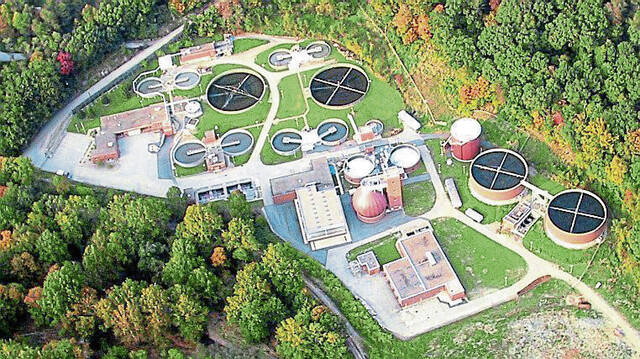Franklin Township sewage authority finalizing system-wide flow model as part of state consent order
The Franklin Township Municipal Sanitary Authority is wrapping up work on a flow model of its entire system, the next milestone in its consent order with the state’s Department of Environmental Protection.
The authority has been conducting smoke-and-dye testing for illegal connections as well as video inspection of all its lines in order to identify areas where clean stormwater — which can be filtered by the ground and does not require treatment — is getting into the sewage system.
The video inspections have shown about a 25% failure rate, authority manager Nicholas Kerr said.
“But most of them are not failed for illegal inflow. They’re failed for infiltration,” he said. “A lot of these homes were built in the ’60s and ’70s, when terra cotta was the dominant pipe material. And it’s strong; it can last forever. But it’s also brittle. If the ground shifts or the pipe is disturbed, they can break.”
Kerr said the biggest issue the authority is identifying is older lateral lines in poor condition.
“Most sewage infrastructure has about a 60-year life expectancy,” he said.
Authority officials also are identifying older neighborhoods that predate the authority.
“In places like that, a developer would build a neighborhood and put in a small package treatment plant,” Kerr said. “And those went in with no inspection.”
One of the first areas the authority has targeted is the Mystic Hills development just north of the Cozy Inn Cutoff along Route 22.
“The main line there is in very poor shape, so we’re going to fix that,” he said. “Most of the overflows we’ve seen are the result of the pipes in some of these older neighborhoods. So it’s a matter of figuring out what pipes you can line and what pipes you have to trench and replace.”
The authority is charged with overseeing and maintaining more than 330 miles of sanitary pipe.
As part of the consent order, a flow model of the entire system must be submitted to the DEP in March. By Sept. 1, the authority must have a plan to eliminate the issues. Kerr said that elimination process already is happening.
Officials in several of the eight towns and authorities that agreed to the consent order expressed reservations about signing on without knowing what the eventual cost might be to fix whatever problems are discovered.
At this point, nearly three years into the consent order, that component might start to become clearer.
In Delmont, the borough is subject to an additional consent order with the DEP and is pursuing plans for a multimillion-dollar project to relocate a gravity sewer line and a force main, and to potentially build a 325,000-gallon equalization tank to hold excess flow — which includes stormwater.
And while the authority’s investigation into inflow and infiltration has proven costly for some homeowners, Kerr said many of the violations have been minor.
“Around 7% of the customers have failed the smoke-and-dye test, and most of those are minor things like the lack of a vent cap. That’s a $15 fix,” Kerr said. “But we’ve also seen some house remodels where drains and gutters will just be tied into the sewer lateral.”
Communities involved in the consent order also must create an ordinance that requires an inspection of sewer laterals anytime a property is sold or refinanced.
“Most of the time when we find a problem, it’s where a lateral has been replaced and the homeowners haven’t contacted us,” Kerr said.
The authority board meets at 6 p.m. Thursday at 3001 Meadowbrook Road, Murrysville.
Patrick Varine is a TribLive reporter covering Delmont, Export and Murrysville. He is a Western Pennsylvania native and joined the Trib in 2010 after working as a reporter and editor with the former Dover Post Co. in Delaware. He can be reached at pvarine@triblive.com.
Remove the ads from your TribLIVE reading experience but still support the journalists who create the content with TribLIVE Ad-Free.

